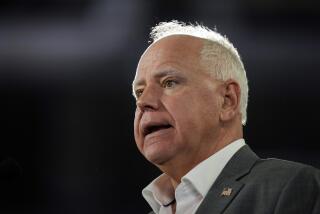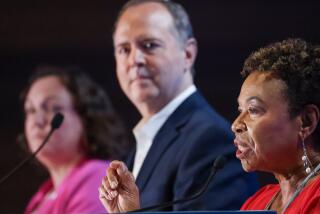Eu Falters in TV Interview, Fuels Doubts on Senate Bid
- Share via
Secretary of State March Fong Eu, who is attempting these days to establish herself as a credible candidate for the U.S. Senate, appeared in a television interview Friday and was unable to respond to questions about the superpowers nearing historic agreement on the reduction of nuclear missiles.
“Now I’m not going to answer your question specifically on that proposal because I’m going to apologize that I didn’t keep up with that. So you’ve got me on that one,” she said.
Instead, she offered only a generality: “We have to really work to have peace and to live with the Soviet Union. I don’t think our world can continue to just be at war with each other constantly.”
The pre-taped interview for KNBC-TV’s “News Conference” program was Eu’s first such television appearance on the topic of her ambitions to seek the Democratic U.S. Senate nomination in 1988 for the seat now held by Republican Sen. Pete Wilson. The show is scheduled to be aired at 9 a.m. Sunday on Channel 4, and is sure to be watched closely by Eu’s advisers and potential supporters.
Some Have Reservations
Some of those who know her best have expressed reservations as to whether Eu, a popular 25-year veteran of state politics, is fast enough on her feet to handle the hurly-burly of a campaign for such a high profile office as U.S. Senate.
Her inability to discuss prospects for the first-ever Soviet-U.S. negotiated missile reductions may fuel such doubts. For more than two weeks, international news has been dominated by the dramatic willingness of Soviet leader Mikhail S. Gorbachev to say that he would agree to reductions in intermediate-range nuclear missiles and the elimination of short-range nuclear missiles in Europe.
On other subjects, Eu gave a more informed account of herself. She said she is arranging an objective and nonpartisan trip to Nicaragua, but guessed that whatever she learned would support her view that the United States should not give assistance to the contra rebels there .
‘Bargaining Chip’
She said the United States should proceed with President Reagan’s controversial Strategic Defense Initiative as a “bargaining chip.”
But at the same time she added, “I have some real qualms about California’s dependence on military production to keep our economy alive. And that’s what it really amounts to--we’re going to grow so dependent on the billions of dollars that come in from the ‘Star Wars’ programs, I wonder if that’s good for California.”
The continuing federal budget deficit probably will force both the Democratic and Republican presidential nominees next year to advocate a tax increase, Eu told a questioner.
Does that mean that she, too, will call for more taxes?
“I’d rather not,” she said.
More to Read
Get the L.A. Times Politics newsletter
Deeply reported insights into legislation, politics and policy from Sacramento, Washington and beyond. In your inbox twice per week.
You may occasionally receive promotional content from the Los Angeles Times.









